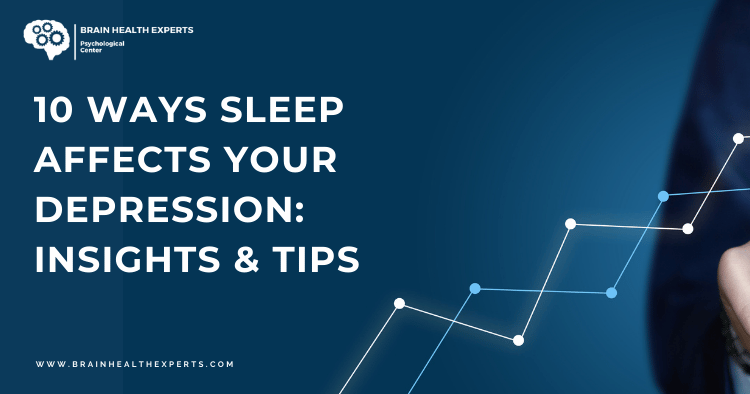Table of Contents
- Understanding the Connection Between Sleep and Depression
- 1. Sleep Deprivation Can Worsen Depression
- 2. Quality of Sleep Matters
- 3. Sleep Disorders and Depression
- 4. The Role of REM Sleep
- 5. Sleep Hygiene: Your Secret Weapon
- 6. The Impact of Naps
- 7. Natural Sleep Aids for Better Rest
- 8. Exercise and Sleep: A Positive Feedback Loop
- 9. Nutrition’s Role in Sleep and Mental Health
- 10. Professional Help: When to Seek It
- Conclusion
- FAQs
Understanding the Connection Between Sleep and Depression
Sleep and mental health are intricately linked. Research indicates that individuals with depression often experience sleep disturbances, which can exacerbate their condition. Understanding how sleep affects depression can empower individuals to take proactive steps toward better mental health. For insights on overcoming negative thought patterns that can affect sleep, check out 10 Tips to Overcome Negative Thought Patterns Today.
1. Sleep Deprivation Can Worsen Depression
Sleep deprivation is a well-documented trigger for worsening depressive symptoms. A study published in the Journal of Clinical Psychiatry found that individuals who sleep less than six hours per night are more likely to experience depressive episodes. When you’re sleep-deprived, your body produces higher levels of stress hormones, which can lead to feelings of anxiety and despair.
“Sleep is not just a passive state; it’s a vital component of emotional regulation and mental health.”
Tips:
- Aim for 7-9 hours of sleep each night.
- Establish a consistent sleep schedule by going to bed and waking up at the same time daily.
2. Quality of Sleep Matters
It’s not just about the quantity of sleep; the quality is equally important. Poor sleep quality can result from frequent awakenings, restless sleep, or not reaching the deeper stages of sleep. This lack of restorative sleep can leave you feeling irritable and down, further trapping you in the cycle of depression. For techniques to boost mental health through positive thinking, explore 10 Positive Thinking Exercises to Boost Mental Health.
“Quality sleep rejuvenates the mind and body, making it essential for emotional well-being.”
Tips:
- Create a calming bedtime routine to signal your body that it’s time to wind down.
- Limit screen time an hour before bed, as blue light can interfere with melatonin production.
3. Sleep Disorders and Depression
Conditions like insomnia and sleep apnea are common among those with depression. Insomnia can lead to persistent feelings of sadness, while sleep apnea can cause repeated awakenings, leading to fatigue and irritability. Addressing these disorders is crucial for improving overall mental health.
“Recognizing and treating sleep disorders can be a key step in managing depression.”
Tips:
- Consult a healthcare provider if you suspect you have a sleep disorder.
- Keep a sleep diary to identify patterns and triggers.
4. The Role of REM Sleep
Rapid Eye Movement (REM) sleep is when most dreaming occurs and plays a vital role in emotional regulation. Lack of REM sleep has been linked to increased emotional reactivity and can exacerbate depressive symptoms. Ensuring you get enough REM sleep can help stabilize your mood.
“REM sleep is essential for processing emotions and experiences, making it vital for mental health.”
Tips:
- Consider a sleep study if you experience disrupted REM sleep regularly.
- Aim for a sleep environment conducive to deep sleep, such as a dark, quiet room.
5. Sleep Hygiene: Your Secret Weapon
Practicing good sleep hygiene can significantly improve both sleep quality and mental health. This includes maintaining a comfortable sleep environment, avoiding caffeine in the late afternoon, and keeping your bedroom dark and cool. For habits that can enhance your positive mindset, refer to 10 Daily Habits to Boost Your Positive Mindset.
“Good sleep hygiene is the foundation for a restful night and a brighter day.”
Tips:
- Use blackout curtains to keep your room dark.
- Invest in a comfortable mattress and pillows that support your sleeping style.
6. The Impact of Naps
Short naps can be beneficial for improving mood and alertness, but long or poorly timed naps can disrupt nighttime sleep and worsen depressive symptoms. Finding the right balance is key.
“Naps can be a double-edged sword: they can refresh you or disrupt your sleep cycle.”
Tips:
- Limit naps to 20-30 minutes and avoid napping late in the afternoon.
- Use naps strategically to boost your energy without affecting your nighttime rest.
7. Natural Sleep Aids for Better Rest
Several natural remedies can help promote better sleep, which in turn can alleviate depressive symptoms. Herbs like valerian root, chamomile, and lavender have calming effects and can enhance sleep quality. To explore affirmations that can support mental health, check out 10 Powerful Affirmations to Boost Mental Health Today.
“Nature provides us with tools; it’s up to us to use them for our well-being.”
Tips:
- Incorporate herbal teas into your evening routine.
- Consider aromatherapy with essential oils known for their relaxing properties.
8. Exercise and Sleep: A Positive Feedback Loop
Regular physical activity not only improves sleep quality but also releases endorphins, which can enhance mood. Interestingly, better sleep can also lead to increased motivation to exercise, creating a positive feedback loop. You can find additional insights on how to cultivate resilience through positive thinking in 10 Ways Positive Thinking Boosts Resilience in Tough Times.
“Exercise can be both a mood booster and a sleep enhancer—making it a vital part of mental health.”
Tips:
- Aim for at least 30 minutes of moderate exercise most days of the week.
- Choose activities you enjoy, such as walking, dancing, or cycling to make it sustainable.
9. Nutrition’s Role in Sleep and Mental Health
What you eat can significantly impact your sleep and mental health. Diets rich in omega-3 fatty acids, whole grains, and fruits and vegetables can promote better sleep and reduce symptoms of depression. For ways to reduce stress through nutrition, check out 7 Foods to Reduce Stress and Boost Mental Wellness.
“Nutrition is a powerful tool in the battle for better sleep and mental clarity.”
Tips:
- Incorporate foods like fatty fish, nuts, seeds, and leafy greens into your meals.
- Limit sugar and caffeine intake, especially in the hours leading up to bedtime.
10. Professional Help: When to Seek It
If sleep disturbances and depression persist despite making lifestyle changes, it may be time to seek professional help. Therapies such as Cognitive Behavioral Therapy (CBT) have shown effectiveness in treating both sleep issues and depression. For more on effective CBT techniques, see 10 Effective CBT Techniques to Overcome Anxiety Today.
“Seeking help is a sign of strength, especially when it comes to mental health.”
Tips:
- Don’t hesitate to reach out to a mental health professional.
- Explore therapy options, including online counseling services for added convenience.
Conclusion
The relationship between sleep and depression is complex, but understanding how they influence each other can help you take charge of your mental health. By prioritizing sleep and making conscious choices about your lifestyle, you can work towards alleviating depressive symptoms and improving your overall well-being.
For inspiring stories showcasing the power of positivity in overcoming challenges, visit 10 Inspiring Stories That Showcase the Power of Positivity.
FAQs
Q: How can I improve my sleep if I have depression?
A: Establish a regular sleep schedule, practice good sleep hygiene, and consider natural sleep aids. If issues persist, consult a healthcare professional.
Q: Can sleep





